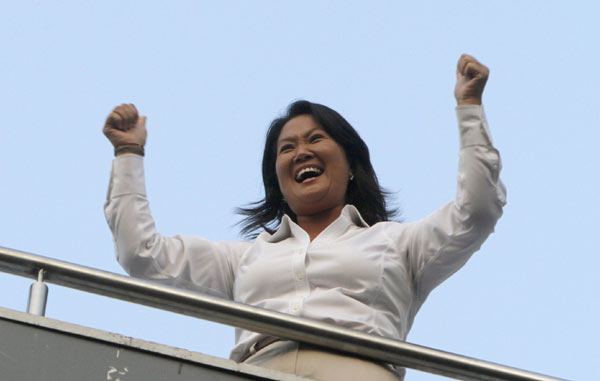Fujimori headed to run-off in Peru presidential election
(Agencies) Updated: 2016-04-11 10:24LIMA - Keiko Fujimori won the first round of Peru's presidential election on Sunday, though the race to be her opponent in the June run-off was locked in a virtual tie between two contenders, three exit polls showed.
|
 |
|
Peru's presidential candidate Keiko Fujimori celebrate after exit polls of the first round of Peru's presidential election in Lima, Peru, April 10, 2016. [Photo/Agencies] |
Ipsos gave Fujimori 37.8 percent of valid votes, Pedro Pablo Kuczynski 20.9 percent, and Veronika Mendoza 20.3 percent. GfK had similar results, while CPI gave Kuczynski a slightly better advantage, with 19.7 percent to Mendoza's 18.8 percent.
Fujimori, a U.S.-educated former congresswoman, would have needed 50 percent for an outright win. She set out early in her campaign to distance herself from her father, imprisoned former President Alberto Fujimori, after she narrowly lost her first presidential bid in 2011 to President Ollanta Humala.
Polls closed at 4 p.m. (2100 GMT) Lima time. Partial results, about 20 percent or 30 percent of votes, will be given at 9 p.m. (0200 GMT) and the electoral body says it will finish counting on Monday.
A runoff between Kuczynski, a 77-year-old former World Bank economist, and Fujimori would likely ensure Peru's free-market economic model remains intact. Mendoza's late surge in opinion polls in recent weeks has spooked markets in the top metals producer.
Kuczynski's supporters danced in the streets with his guinea pig mascot after exit polls were reported. However, in previous elections early results have underrepresented rural areas, where Mendoza and Fujimori have stronger support.
Growing opposition to Fujimori means she is vulnerable in a second-round vote. The most recent Ipsos poll showed Kuczynski would beat Fujimori in a second-round election by seven points, while Mendoza was seen in a statistical tie with her. Fifty-one percent of Peruvians polled told Ipsos they would "definitely not" vote for her.
Kuczynski's economic adviser, Alfredo Thorne, said that exit polls showed Kuczynski had stronger support in rural Peru than in 2011, when he struggled to connect with voters outside of Lima during his first presidential bid.
Mendoza, whom opponents have tried to link to late Venezuelan president Hugo Chavez, thanked her supporters from her home city of Cuzco, once the capital of the Incan empire. "We've shown that we can do politics differently!" she said.
A center-right populist, Fujimori has vowed to preserve democracy and extend 25 years of free-market policies.
However, support for Fujimori slipped after two of her rivals were ousted from the race and tens of thousands protested her candidacy on the day her father shuttered congress 24 years ago.
Alberto Fujimori, a right-wing populist who is serving a 25-year prison term for human rights abuses and corruption during his 1990-2000 rule, is fondly remembered by some for building rural schools and hospitals and implementing neo-liberal reforms that remain in place. Keiko Fujimori famously became Peru's first lady at 19 when her parents divorced.
She says her father is innocent and should be absolved by the courts but has promised not to use her political power to free him from jail or repeat his authoritarian tendencies.
"I voted for Keiko because she's not to blame for what her father did," said 41-year-old Carlos Zevallos. "Crimes aren't inherited."
The elder Fujimori said his hard-line measures were necessary to defeat the Maoist-inspired Shining Path insurgency.
In a reminder of that bloody conflict, rebels presumed to be remnants of the Shining Path on Saturday ambushed soldiers sent to safeguard ballots, leaving at least six dead, authorities said.
The head of the Organization of American States mission to Peru, Sergio Abreu, said there had been some isolated delays in voting but that Sunday's election had otherwise been calm, "an exemplary act."







